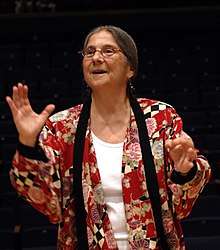Catherine Roma
Catherine Roma (born 1948) is an American choral conductor and activist. She was a founding conductor and organizer of the US women's choral movement. She founded the feminist Anna Crusis Women's Choir in Philadelphia, Pennsylvania in 1975, MUSE, Cincinnati's Women's Choir in 1984, the Martin Luther King Coalition Choir in 1992 and the World House Choir in 2012.
Catherine Roma | |
|---|---|
 Catherine Roma conducting MUSE's 25th Anniversary Spring Concert, Cincinnati, Ohio. | |
| Background information | |
| Born | 1948 (age 71–72) Philadelphia, Pennsylvania, United States |
| Genres | Choral |
| Occupation(s) | Choral conductor, Professor of music, activist |
| Associated acts | Anna Crusis Women's Choir MUSE, Cincinnati's Women's Choir, World House Choir |
Biography
Catherine Roma was born in Philadelphia on January 29, 1948.[1] She attended Germantown Friends School, a Quaker School. Roma earned degrees in music and choral conducting at the University of Wisconsin–Madison and became involved in lesbian and feminist politics while studying there.[2] While in Wisconsin she worked with historian Ann D. Gordon to identify music by and about women throughout history, creating the folk opera American Women: A Choral History for the United States Bicentennial.[3] After returning to Philadelphia in 1975 to teach music at Abington Friends School,[2] she formed the Anna Crusis Women's Choir, which performed American Women: A Choral History at a number of colleges throughout the northeast.[4]
By starting Anna Crusis, the first feminist women’s choir in the United States, Roma became one of the founding mothers of the women's choral movement.[5] Her beliefs in feminism, social justice, and Quaker models of leadership fundamentally shaped the mission and direction of Anna Crusis.[2] Decisions were often made through a process similar to Quaker consensus, in which all members had a voice.[6][7]
Roma left Anna in 1983 to pursue a graduate degree in music at the University of Cincinnati's College-Conservatory of Music, receiving her Doctor of Musical Arts Degree in 1989. In Cincinnati Roma founded MUSE (Cincinnati's Women's Choir).[2] She has also helped to establish the UMOJA Men's chorus at Warren Correctional Institution.[8] and the diverse, mixed voice World House Choir in Yellow Springs, Ohio. The name for the World House Choir is taken from a reflection by Dr. Martin Luther King in which he likens the modern world to a house that we must live in together.[9]
In 2008, Roma won the Governor’s Arts Award from the Ohio Arts Council and Ohio Citizens for the Arts Foundation for her involvement in community development and participation.[10] Roma received a Lifetime Achievement Award from the Gay and Lesbian Association of Choruses in 2012.[11] She received the University of Cincinnati Alumni Association Mosaic Award in 2014 for her use of "music as a means of inclusion and understanding".[12]
References
- Follet, Joyce (June 2005). Catherine Roma: Voices of Feminism Oral History Project (PDF). Sophia Smith Collection, Smith College. Archived from the original (PDF) on 2016-08-13. Retrieved 2016-06-18.
- Follet, Joyce (19–20 June 2005). "Catherine Roma" (PDF). Voices of Feminism Oral History Project. Sophia Smith Collection, Smith College. Retrieved 23 June 2014.
- Zimmerman, Bonnie, ed. (2000). Encyclopedia of lesbian and gay histories and cultures. an encyclopedia (online ed.). New York: Garland. p. 517. ISBN 978-0815319207.
- Doane, Kathleen (2004). "MUSE's muse: How Catherine Roma created a women's choir that sings in a diverse key". Cincinnati Magazine.
- "The Dr. Catherine Roma Women Composers Commissioning Project". GALA Choruses. Retrieved 16 July 2014.
- Shea, Kathleen (24 January 1992). "Anna Crusis: Many Voices, One Spirit". Philadelphia Daily News. Retrieved 10 June 2014.
- Roma, Catherine. 1992. "Women's Choral Communities: Singing For Our Lives." Hot Wire: The Journal of Women's Music and Culture, 8 (1): 36-39
- Roma, Catherine (2006). The choral music of twentieth-century women composers : Elisabeth Lutyens, Elizabeth Maconchy, and Thea Musgrave. Lanham, Md. [u.a.]: Scarecrow Press. p. 207. ISBN 978-0810850293. Retrieved 26 June 2014.
- Seitz, David (8 August 2013). "Inside The World House". 91.3 WYSO. Retrieved 10 June 2014.
- "Cathy Roma Wins 2008 Governor's Arts Award". Cheney University News. 12 December 2007. Archived from the original on 3 March 2016. Retrieved 10 June 2014.
- "Cathy Roma to Receive GALA Lifetime Achievement Award". MUSE. Archived from the original on 22 August 2016. Retrieved 18 June 2016.
- "Two CCM Alumni Honored by UC". University of Cincinnati Alumni Association. 2014. Retrieved 10 June 2014.